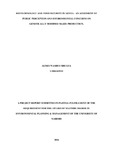| dc.description.abstract | According to International Institute of Tropical Agriculture (2009), maize is the most essential cereal crop in sub-Saharan Africa (SSA) and an important staple food for more than 1.2 billion people in SSA and Latin America. Although most maize is used as animal feed, it is a staple food in numerous countries, predominantly in sub-Saharan Africa and South Asia. For instance, the consumption of maize in Kenya has been reported to be 400 g per person per day. The purpose of this study was to establish:- a) the public’s perception towards the importance of biotechnology on maize production for food security in Kenya, b) the environmental implications of maize related agro biotechnology on national biodiversity conservation and biosafety and c) the public health concerns on the introduction of maize related agro biotechnology in Kenya.
The study population included two clusters, namely maize farmers and consumers. The farmers were interviewed from two maize farming zones, namely Githunguri Ward (Kiambu County) as a small scale production area and Moiben Ward (Uasin Gishu County) as a large scale production area. .The consumers on the other hand were interviewed from Umoja 1 Ward (Nairobi County). Maize is the principal staple food in Nairobi in terms of kilograms consumed per adult equivalent. Nairobi has several sub-counties including Embakasi where the study was undertaken within the Umoja. Residential Estate which is a middle income residential area.The number of enumeration areas (EAs) was based on planned 10-household interviews per EA, resulting in a total of 12 EAs; 6 from Umoja 1, 3 from Githunguri and 3 from Moiben with a total of 120 respondents including 60 maize producers and 60 consumers. The data analysis was undertaken using descriptive statistics and inferential statistics like Man U Whitney test the initial phase using frequencies and cross tabulations.
The findings showed that majority of Kenyans especially consumers believe that GM maize will solve the problem of food insecurity in the country because there is a critical need to produce more maize in order to meet the increasing food demand. Out of the 120 surveyed respondents 69% agreed that GM maize will play a great role in solving food insecurity in Kenya. Only 34% of the respondents agreed that current maize production methods are sufficient to meet Kenya’s food security needs. The respondents portrayed confidence that GM maize will be beneficial to farmers. 65% of the respondents agreed that GM maize will improve the profitability of the growers due to the increased yields per unit area. In addition, 60% of the respondents believed that GM maize will benefit the society because it will allow farmers to produce food more efficiently. 51% believed GMO foods will play a major role in solving malnutrition problem in Kenya. On the flip side, majority of the respondents were concerned about the likely environmental and health risks. 76% of the respondents were concerned that GM maize will contaminate the conventional crops through cross pollination. More than 6 in every 10 respondents believed that GM maize will be harmful to non-target insects, while 49 % believed that some of the GM maize will invade the environment and become uncontrollable. With regards to public health and religious concerns on the introduction GM maize, it was established 90% of the respondents were in favour of food labelling to show the presence of biotech ingredients. In addition, 55% of the respondents believed that GM maize might lead to human sickness and death.
The study concluded that Kenyans would like a more integrated approach to address the food security issue without over relying on any particular technology. There was appreciation of GM technology will play a critical role in addressing the food insecurity issue in Kenya. However there were also concerns that introduction of GM crops will have a negative impact on the environment. In view of the outcome from this study, a national policy on food labelling is recommended to ensure that information is availed to consumers at the point of product purchase. A policy to regulate GM seed distribution in the county will also be critical to minimize the environmental impacts associated with cross-fertilization. | en_US |



